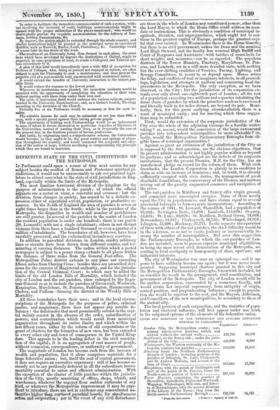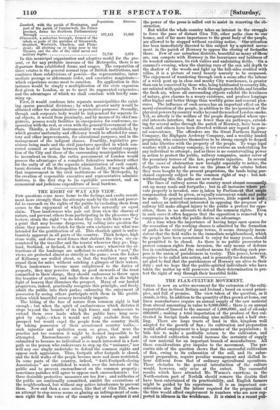DEFECTIVE STATE OF Tfit: CIVIL INSTITUTIONS OF THE METROPOLIS.
IF Parliament could spare a corner of time next session for any subject besides the conflict of Roman and Protestant' spiritualju- risdictions, it would not be unreasonable to ask our practical legis- lators to attend somewhat to the state of civil jurisdictions in Eng- land, especially within the limits of the Metropolis.
The most familiar territorial division of the kingdom for the purpose of administration is the parish ; of which the official adjuncts are a rector or vicar, .a constable and overseer : but the division, from changes in society, has ceased to' be a definite ex- pression either of superficial extent, pepailation, or productive re- sources. In the North of,F.ngland the area of parishes is seven or eight times larger than in the South ; while in the parishes of the Metropolis, the disparities in wealth and number of parishioners are still greater. In several of the parishes in the centre of London the resident population is under one hundred ; there is one parish (St. Leonardts) with not a single inhabitant; others in not distant vicinage from these have a hundred thousand or even a quarter of a million of inhabitants. The boundaries of all, however, have been carefully preserved, and the ecclesiastical incumbency survives. In addition to parochial divisions in London, sundry arbitrary lines or circuits have been drawn from different centres, and ter- minating at varying distances. The radius within which a posted newspaper is subject to a penny stamp extends to all places within the distance of three miles from the General Post-office. The Metropolitan Polite district extends to .any place not exceeding fifteen miles from Chairing Cross : besides these are prescribed divi- sions for the exercise of Magisterial authority, and for the jurisdic- tion of the Central "Criminal 'Court ; to which may be added the limits of the old London Bills of Mortality, which included the city of London and the out-parishes, sinoe enlarged by the Regis- trar-General so as to include the parishes of Greenwich, Woolwich, Kensington, Marylebone, St. Pancras, Paddington, Hammersmith, Chelsea, and Fulham—forming the district of the Weekly Bills of Mortality.
All these boundaries have their uses; and in the local circum- scriptions of the Metropolis for the purposes of police, criminal justice, and magistracy, there does not appear any notable de- ficiency: the deficiencies that most prominently subsist in the capi- tal mainly consist in .tb.e absence of the -order, subordination of powers, and centralization which would result from municipal organization throughout its entire limits, and which within the last fifteen years, either by the reform of old corporations or the grant of charters for the formation of new ones, has been extended to every other city and town of consequence in the -United King- dom. This appears to be the leading defect in the civil constitu- tion cif the capitol; it is an aggregation of vast masses of people, without connexion, correspondence, or uniformity of government The magnitude of London has become such from the increase of wealth and population, that it alone comprises materials for a large federative union; but, itself the seat of central government, it does not require an executive supremacy: still it has become se- riously not to say perilously deficient in all the subordinate instru- mentality essential to union and efficient administration. With the exception of the cluster of little parishes within the jurisdic- tion of the City, mostly consisting of offices, shops, wharfs, and warehouses, whatever the urgency from sudden outbreaks of any kind, or whatever. the Metropolitan improvement it may be expe- dient to introduce, there are not in existence any concentrated au- thorities higher tintu scattered parochial boards, for simultaneous action and codperation; ner in the event of any civil disturbance
are there in the whole of London any constituted powers, other than the Lord Mayor, to which the Home Office could address its man- date or instructions. This is obviously a condition of municipal in- aptitude' ' disunion and unpreparedness, which ought not to con- tinue in the greatest capital of Europe, perhaps the greatest capi- tal that ever existed. In Westminster there is the Horse Guards; but there is no civil government, unless the Dean and the nominal Lord High Steward, and the hardly lees nominal High Bailiff' and Court of Burgesses and Assistantswith batches of court-leets for short weights and measures—can 'be so regarded. The populous districts of the Tower Hamlets, Finsbury, Marylebone, St. Pun- eras, and Lambeth, are in a still more denuded state, with nothing but the ever-shifting crudities of Vestries, Paving, Lighting, and Sewage Committees, to resort to or depend upon. Hence arises the delay, and conflicts of real or imaginary interests, in all proceed-
, ihgs, legislation, and attempts at uniform and concurring local im-
provements in the Metropolis. The only exception, as we have observed, is the City ; but the jurisdiction of its corporation ex- tends over only about one-eighteenth part of London ; all the rest of a population exceeding two millions and a quarter inhabiting the dense chain of parishes by which the primitive nucleus is environed and literally built in for miles distant, are beyond its pale. Mani- festly, then, for this great outlying circnmvallation there is a want of municipal unity ; and for meeting which three sugges- tions may be submitted. First, would the extension of .the corporate jurisdiction of the
City over the whole of the adjoining vicinage be a feasible under- taking ? or, second, would the conversion of -the large extramural parishes into independent municipalities be more advisable ? or, lastly, would the Metropolitan Parliamentary Boroughs form eli- gible bases of municipal organization ?
Against so great an extensionnf the,jurisdiction Of the City as is supposed by the first question, are the obvious objections, that its present administration is not highly 'popular within or beyond itspurlieus; and so acknowledged are the defects of its corporate institutions, that the present Premier, M.P. for the -City, has an unredeemed pledge on record for the reform of them. With such drawbacks, the London Corporation is plainly in no condition to claim so wide an increase of dominion ; and, in truth, it isnlready sufficiently occupied with civic duties, the management of great charitable foundations, the conservancy of the Thames, andmatters arising out of the greatly augmented. commerce and navigation of the river.
The out-parishes in Middlesex and'Surrey offer -virgin ground, and command more unoccupied energies. Some of them nearly equal the City in populousness, and have claims equal to several provincial boroughs to form separate incorporations. Azeording to the census of 1841, St. Leonard, Shorediteli, had a population of 83,342; Newington Butts, 54,606; Lambeth, 115,888; Sterne , 53,633; St. Luke, 49,829; St. 21attlievr, Bethnal Green, 74,088; Bermondsey, 34,947; Clerkenwell, 56;756; Whitechapel, 84,053; Islington, 55,690; Ifackney,-37,771. In the separate incorporation of these with others of the out-parishes, the chief difficulty would be in the selection, so as not to excite jealousy or inconveniently in- crease the number of municipalities. But over this suggestion the Parliamentary Boroughs, in which the out-parishes of Lon- don are included, seem to possess superior municipal eligibilities, in being the most recent civil demarcation of the Metropolis, ac- cording to local contiguity or homogeneity of class, opulence, and industrial interests.
The city of Westminster was once an episcopal sec—and it ap-
pears to have suddenly become one again ; but it was never incor- porated. Supposing municipal charters granted to this city and the Metropolitan Parliamentary Boroughs, Greenwich inchided, let us consider the result in the arrangement, civil constitution, and government of the Metropolis. The city of London would still be the mother corporation, surrounded by a numerous family, and would retain her imperial supremacy, from antiquity of origin, central position, and preponderating influence ; except in popula- tion she would be superior to the rest, and -the Mayers, Aldernien, and Councillors, of the new municipalities, be secondary to those of the ancient city. The local position of each corporation, and the statistics of-popu- lation and electoral influence, -will best appear under one head, in the subjoined epitome of the elements of the federative union.
CITIES AND BOROUGHS OF THE METROPOLIS AND SUBURBS RETURNING MEMBERS TO PARLIAMENT.
Population! illectoes.+
London City, the Metropolitan centre; con-
taining ninety-seven parishes within and
sixteen without the ancient walls 129 20,250
,702
Southwark, on the Surrey side ; under the juris- diction of the City 142'620 9M0Westminster, the Western extremity of the Me-
tropolis, contains ten parishes 219,930 10,312
.Finsaury forms the Northern Parliamentary division of London ; including portions of the parishes of Islington, St. Luke, Clerkenwell, and St. Andrew Holborn, and several of the Inns of Court 266,O43 11,7486 Marylebone, with the parish of Paddington and part of the parish of St. Pancras, forms the
North-western portion of London 287,465 1079
Tower Hamlets, comprising the parishes of Shoreditch, Spitalfields, Poplar and Blackwell,
Wapping, Whiteohapel, andLiher- of the Liberty of the Tower ; they form the
ty 91 Nortonfolgate, with the several divisious 419,730 21,1n
North,eastern Parliamentary Borough
• From the last census. 1. From tte registry of I549-50.
Population. Electors.
Lambeth, with the parish of Newington, and partof the parish of Camberwell, the Palace precinct, forms the Southern Parliamentary Borough 197,412 13,885 ..Greentatch, a suburban borough, formed of the
-whole or parts of the parishes of Greenwich, rDeptford, Woolwich, Charlton, and Plum- stead ; all abutting on or lying near to the Thames, and the site of the chief naval and
military depots. 72,748 5,976
In this municipal organization and adaptive model for the pre- sent, or for any probable increase of the Metropolis, there is no departure from established forms and usages. The corporation of • three estates is the general normal type of British institutions, and combines those subdivisions of powers—the representative, inter- mediate peerage or aldermanic order, and executive magistrate— which experience seems most to sanction. Its application in this instance would be simply a multiplication of the civic organism first given to London, so as to meet its augmented exigencies ; and the advantages of which we shall conclude with briefly sum- ming up. First, it would condense into separate municipalities the exist-
ing sparse parochial divisions ; by which greater unity would be obtained either for administrative or protective purposes. Secondly, though each corporate body would be independent for separate lo- cal objects, it would from proximity, and by means of its chief ma- gistrate, possess ready facilities in emergencies for conference, co- operation with the rest, or even with the general Government of the &ate. Thirdly, a direct instrumentality would be established, by :which greater uniformity and efficiency would be afforded for Sana- tory and other improvements, for educational purposes, and in the management of the indigent classes. Fourthly, legislative pro- visions being made and the civil junctures specified in which con- certed council or action between the head of the central corpora- tion of the City and those of the surrounding municipalities would be incumbent on them, the entire government of London would possess the advantages of a complete federative machinery either for the unity of all or the separate administration of each consti- tuent division of the Metropolitan Union. Lastly-, it may be added, that improvement in the civil institutions of the Metropolis, by the creation of responsible executive and representative adminis- trations, is the first step to its equitable assessment, and an economical and judicious expenditure of local burdens.



























 Previous page
Previous page